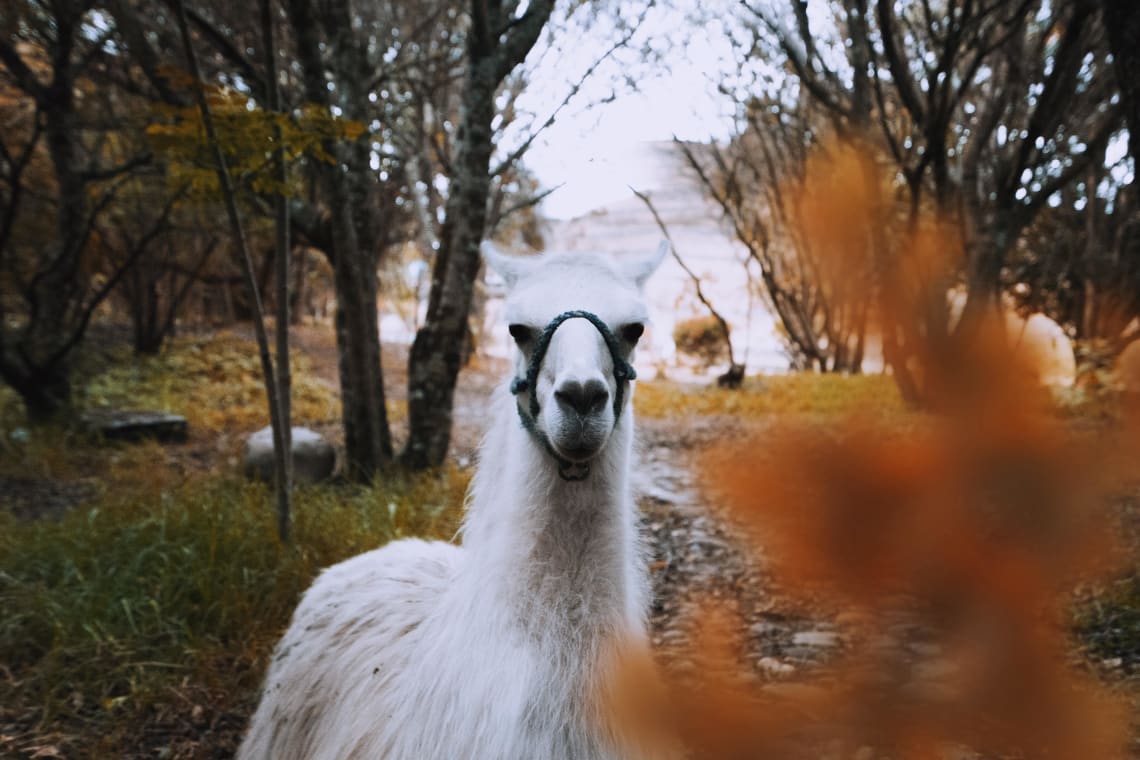
- Travel more for less
- Become a member by 01/31/2026 and get 10% OFF on bookings at FlixBus!
Life away from the borders of one's home country often comes with the burden of other people's judgment. If living a nomadic life is your reality, how do you deal with other people's criticisms?
8min

My lifestyle is by no means typical.
I live in a city in the highlands of Ecuador where mountain ridges look like the teeth of a crooked smile. On the edges of the river that runs down from high ground, I often spot a man with goats on a leash. Sundays are frequently reserved for a hike or walk through the national park nearby where I cross my fingers hoping to spot a family of fluffy alpacas. Every day, I speak in a language that isn't my native tongue, I eat tropical fruits and sometimes, I salsa dance to Latin music.
It's not lost on me that this recent lifestyle change (or "nomadic lifestyle" as mainstream culture has come to call it) is outside of the norm, weird by some people's standards and a lifestyle on which it's easy to cast judgment for critical spectators.
At first glance, my life may even seem like no work and all play. But while the aforementioned Ecuadorian novelties — alpacas, mountains, salsa dancing, and goats — are often a part of a normal day (these are the pros!), so are the lesser mentioned responsibilities that come with adult life anywhere.

There's so much buzz about these transient, remote working lifestyles.
"What is a nomadic lifestyle?" is kind of a standard question in a world where twenty and thirty-somethings with two degrees and years of work experience can suddenly up and leave home drifting from place to place while remaining fully employed so long as there's a solid WiFi connection.
That's exactly what a modern nomadic lifestyle is. It's where professionals live in a way where work and travel aren't mutually exclusive. For me, I choose to be based in a city in Ecuador and every couple of weeks, I travel and get work done while on the go without changing my work schedule. This makes me less nomadic than most people who live the digital nomad lifestyle.
Here's what it looks like: every day, regardless of where I am, I wake up, brew a cup of coffee and start my day with a to-do list and work. Every day, I'm working on my assignments and brainstorming ideas for new ones. My freelancing (is and has to be) my first priority.
Straying from one's home borders doesn't mean that costs of living disappear. I run the same boring errands that I'd do at home in Canada, I cook my meals, I do the same housework. In other words, living a non-traditional lifestyle abroad doesn't mean I'm living responsibility-free.
A lot of others living a nomadic life probably relate. There are a lot of pros however there's also one big con: Life away from the borders of one's home country often comes with the burden of other people's judgment— if even subtle.
For me, that judgment comes in the form of people thinking that I don't work, or that I write merely as a hobby on the side. I'll hear things like "Do you still work while abroad?" or "So do you just write every once in a while?" or, my personal favorite, "But what are you going to do when you get back?!"
Before I left Canada, one person thought I was too old to travel (I was 26). Another thought I was overlooking the dangers while away or that I was leaving for too long. Some didn't say anything out loud but their facial expressions indicated that something was being left unsaid. I'm in my twenties but I assume that this is worse for older travelers.
Needless to say, choosing to leave home and take a sabbatical turned out to be one of the best decisions of my life.
I should point out something though: most people were actually quite supportive. Most people were excited for me and the adventures waiting for me in the untamed jungles and rolling green mountains of South America. Many asked questions about how to quit your job and start traveling or pondered about the idea of living like a nomad too.
That said, the skeptical voices still shook me and the judgmental ones stung. So, if living a nomadic life is your reality, how do you deal with other people's criticisms?

You've heard it before: you don't owe anyone an explanation for the way you have chosen to live your life. That goes for career choice, marital or parental status, how much money you earn, the food you like, how you spend your time and, of course, where you choose to spend your time.
A conversation shouldn't feel like you're being made to pass some sort of test arbitrarily created by whoever you're talking to. I mean, who granted them authority? The boss of you is... you. If you start falling into the trap where you begin to explain yourself, cut it out.
Sure, it can be hard to remember that sometimes. I'll often be talking to someone wondering if they secretly think that I've taken a quarter-life crisis way too far and then I slip in a detail to remind them of the contrary. What's the point? I've chosen a path for my own reasons.
I've chosen to work outside of a traditional role and I've chosen to go at it alone. The only person's approval of my nomadic way of life I need is my own. I already have that... obviously!
As my days of living in Toronto started to come to a close, I was spending a lot of time in a negative environment which I was unable to avoid. I heard and absorbed a lot of toxicity while spending time with this group of people.
It was an environment where these people spoke poorly about anyone doing anything outside of the status quo. In conversation, I mentioned a friend of mine working and living in Colombia and without missing a beat, someone in the group snarkily suggested she was making herself unemployable by living there.
Another time, I floated the idea of living abroad in Europe for one year. It was immediately shot down. The whole environment was negative, negative, negative.
When I stopped spending time with this group of people, the changes in my mental health and my own inner dialogue were strikingly obvious. I judged myself less harshly. I admitted my pipe dreams to new friends and was supported and even encouraged.
The change was night and day. I hardly expected my own thoughts and conversations with myself to shift so much. Since I didn't agree with the commentary in that social environment, I wouldn't have expected that it could have impacted me so much. Examining it from the outside, I see how much it did.
That's why I now say, limit your time spent hanging out with negative groups. They will bring you down. You will believe and absorb their negativity and their judgment.
It's not always realistic to completely cut out negative people. We all have downer family members, coworkers, bosses, clients or in-laws who are toxic. Unfortunately, you can't always sever these relationships.
So, if that's the case, limit what you tell these people about your life. Spare yourself by not giving these negative people the bait to launch into a spiel that will bring you down or have you doubting yourself.
In Toronto, I actually didn't share the details of my travel or independent freelance plan with most people until they were already set in stone. While jumping into something scary, I didn't need anyone to add to the anxiety that already existed for me. So, I kept silent until my bank account was ready, my flight was booked, my living situation in Colombia was set up and I had a roster of clients lined up.
In doing this, I probably saved myself some addition breakdowns...
The opposite of cutting out negative friends is adding positive ones. If you're someone who has constantly been saying "I want to be a nomad," then find other people who are doing that. Not only will they offer the tricks of the trade, but they'll also give you the encouragement and motivation that you need.
In Ecuador, all of my friends understand the frustrations I had with my former day-to-day routine in Toronto because they had similar grievances before they left their home countries. By spending time with other expats and travelers, you're increasing the chances of meeting open-minded non-judgmental people.
Folks come from different cultures and socio-economic backgrounds. Many are singletons exploring the world alone or newly divorced people enjoying their newfound freedom. Travelers and expats have varying levels of income and lines of work. Everyone has a different strategy and reason for being abroad.
When everyone's circumstances are so different, status quo goes out the window and there's literally no reason to judge. This is just one of the many ways in which travel breeds open-mindedness.
Simply becoming aware of a habit enables you to change it. It's hard to establish new patterns if you don't even understand the ones that already exist.
For example, I mentioned learning to stop justifying yourself to other people... but that's easier said than done. Start by just paying attention to when you're explaining yourself to others. After a while, you'll catch yourself explaining yourself when no one even asked.
The self-awareness leads to change because you'll start to care more about this habit than you do about other people's opinions. You'll be less impacted by others' judgmental statements when you simply don't care.

If other people's attitudes get you down or their line of questioning leaves you feeling anxious about your life path, look back on all you've done while being a nomad.
I keep an Instagram account mainly so I can have a personal photo album of the best moments of my travels and my favorite scenes from South America. Something like this is the perfect tool for remedying any anxiety stemming from others' criticism.
To me, you can't put a price tag on these experiences and memories that I'll have forever. Sure, other people's questions or subtle judgment leads to a lot of doubt sometimes. But in those moments when I wonder if I'd be better off settled or spending my days in a more predictable way, I look back on these photos.
There I see rooftop scenes in Quito, sunsets and graffiti art from the coasts of Colombia and Ecuador, jungle adventures in the Amazon, lush coffee farms and floral landscapes. As I scroll, I relive that tropical storm that appeared mid-hike out of nowhere, that yoga session on a calm, crisp morning, that terrifying boat ride and drinking fresh orange juice after a sunburnt afternoon. There's me on a swing above a mountain ledge, posing on top of a crumbly peak after a hike, smiling with people whose friendship I didn't have this time a year ago and wading in freezing waterfall pools.
Those moments right there, that's why I do this. At the end of the day, other people's opinions don't matter because I have no regrets.
Sometimes I just need that reminder.
Write here your questions and greetings to the author
Terence
Jul 17, 2019
Yes, well written, and helpful suggestions Sinead - thanks for that - Terence.
Faby
Aug 04, 2019
Thanks for sharing your experience! 👏🏻👏🏻👏🏻 I’m feeling much more motivated now to start my own experience!